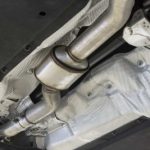Dodge 4.7 Engine Problems (8 Issues Solved)
Since its introduction in 1999, the Dodge 4.7-liter V-8 engine has gotten mixed reviews from owners because it is a powerful, efficient, and dependable machine with respectable power output (310 horsepower and 330 pound-feet of torque).
However, most of its technical faults are due to a lack of periodic maintenance, which will cause any engine to die prematurely.
We will look at the numerous Dodge 4.7 engine problems and solutions in this article. You will be able to assist your Dodge 4.7L engine by the end of this essay.
“Dodge 4.7 engine, also known as the Chrysler PowerTech engine, is a powerful and long-lasting engine. It, like any other engine, is not immune to common engine issues. However, most Dodge engine problems have been found to be a direct result of the amount of care given to it in the past.”
You might also like to check out dodge 6.4L Hemi vs 6.7L cummins engine.
Is the Dodge 4.7 a Good Engine?
Every engine has advantages and disadvantages, but 4.7 is a good option. In my prior truck, I had one, and it never failed me.
These engines are simple to maintain and, if not intentionally destroyed, can last if a hemi.
Dodge 4.7 engine has a solid cast-iron bedplate and block, as well as a limited number of computer systems and dependable timing chains.
Both of my pickups had more than 250k miles on them. Most importantly, that oil must be changed regularly. Dodge 4.7’s issue is that they despise being in the heat.
They also have the issue that if your engine water is not replaced regularly, rusted material from your engine block will clog in the radiator, resulting in greater temperatures.
What Are the Common Problems with a 4.7 Dodge Engine?
01. Engine Failure
Engine failure is the most common complaint among drivers. If you take exceptionally safe care of your car`s engine and do not forget to maintain it regularly, it will last you a long time.
Dodge 4.7-lit has an average lifespan of 100K miles. Typically, problems with engine breakdown begin around the 70K-mile mark. So, what would you do to stay away from this?
Solution
To try to cut costs, some experts advocate changing various pieces of the motor (a new engine will be expensive).
However, if the item is quite old, it is preferable to consider replacing it entirely. An aftermarket engine will not break the bank if you are driving an ancient Dodge vehicle or SUV.
02. Oil Buildup
Oil buildup is also known as oil sludge, and it occurs when the oil in the engine becomes too thick, preventing the motor from performing at its best.
And when the oil gets heavier, it clogs up everything else in the engine block. If the problem is severe enough, the automobile will simply not start.
Engine and gearbox failure regularly are clear indicators that it is time to change the oil.
Solution
Do not skimp on the quality: invest in a well-known brand of high-quality oil. That should ideally be synthetic.
A complete oil change, unfortunately, does not always resolve the issue. You may need to address some ventilation issues.
Of course, I am referring to the crankcase and the PCV. Allow a mechanic to take care of it if you are not up to it.
03. Oil Forming
Most drivers will never encounter oil forming, but if you do, you will immediately recognize that something is amiss.
There will be a bunch of foaming in the oil, but it will not be on top of it; rather, it will be at the bottom. What exactly does that imply?
Well, there is a lot of air in there with the oil, which is bad news. One of the engine’s worst adversaries is air. But the air bubbles could be little. Another explanation for this is humidity.
Solution
My recommendation to you is to make sure your engine is warm before starting your car. But it is the air that is wreaking havoc; let us see what we can do about it.
As previously stated, good-quality oil can solve a variety of engine issues.
However, if the bubbles are not going anywhere, the vacuum seal or casing is most likely destroyed. If that is the case, go to the nearest auto shop.
04. Overheating
Overheating is common in hot & humid climates. Off-roading affectionate, who continually strain the powertrain to its limits, frequently worry about overheating.
Lack of effective air filtering is the leading cause of an overheated engine. While the factory production is adequate, it is not without flaws. Investing in an extra air intake kit is the best answer for this.
Solution
Your engine`s input tube will enhance airflow significantly, while the in-built filter will keep trash and dust out of the engine, extending its life.
A less expensive option is to use coolant. Make sure you check your equipment regularly.
Pay special attention to the gauges, as they will be the first to notice a problem. Your engine will get “rumbly” as a result, which is another telltale indicator.
05. Ticking Sounds
If you have had to cope with a vexing ticking noise emanating from your car’s engine, it is a hard one because it might suggest a significant problem at times and nothing serious at other times.
Begin with a diagnosis, as is customary. Your engine is short on lubricant; add more oil, and the noise should go away (hopefully).
If you are lucky, simply running your engine for about one or two minutes to warm it up may be enough to fix the problem.
06. Head Gasket Failure
With time and usage, head gasket issues on a 4.7L engine may occur naturally. Overheating, on the other hand, is the most typical reason for head gasket failure.
If an engine is allowed to overheat for an extended period, it will always develop head gasket difficulties. Dodge 4.7 engine is far less forgiving than other engines.
Solution
That is why the cooling system issues were brought up first. If you suspect a problem with the cooling system, pull over to a safe location right away.
Do not take any chances and hope to complete the last few kilometers of your journey.
Without minding whether your engine has overheated, the 4.7 head gasket is subject to failure.
However, if you already have a cooling issue, it is advisable to err beside the caution and avoid risking a head gasket failure. Repairing a head gasket is not cheap.
We do not advocate doing this yourself because it is a long and difficult operation, and if you do not know what you are doing, you could end up causing more harm to the engine.
If you need to change the head gasket, you do not have a choice except to pay the high price. Make an appointment with a technician.
07. Valve Cover Leaks
Originating from the BMW world, we are well-versed in oil leaks from valve covers and valve cover gaskets.
Oil leak is a regular problem with the 4.7L engines, particularly as they get older and have more miles on them.
As the gaskets produce microscopic fractures, oil leaks are usually minimal at first. However, if the leaks are not repaired, they will get worse over time.
Solution
It is not an emergency fix and driving for a brief period with a valve cover leakage is not a big deal. We still advise that you rectify the leak as soon as possible.
Based on where oil is pouring from, it could spark a fire or deteriorate other components. Because a Dodge 4.7 V8 is almost 12 years old, leaks can happen at any mileage.
Leaks from valve cover gaskets are particularly common northward of 100,000 miles. Short-distance engines are also more vulnerable due to the continuous heating & cooling of the gaskets.
08. Valve Seat Failure
Sometimes the valve seats on some 4.7L engines may be defective. We will skip the technical talk if you are unfamiliar with valve seats.
But the valve seats’ role is to help seal the inlet and the exhaust valves when they are closed, as shown above. If these valve seats fail, the inlet valve will not seal entirely.
As a result, this causes a decrease in compression, especially in the Jeep 4.7L. Most cylinder will just leak air as the attempts to compress during the compression stroke.
Valve seat failures is a major issue with significant implications for engine performance. Valve seat failures can have serious repercussions if left neglected for an extended period.
Overheating is the primary cause of valve seat and head gasket failures. Another cause to be cautious about is if your water system malfunctions or overheats.
In any event, valve seat issues can and do arise. However, because these things are prone to be exaggerated on the internet, it may not be fair to label them a frequent problem.
In fact, this problem is restricted to early 4.7L engines.
Click this video to learn more about dodge 4.7 engine problems and solutions.
How Much Horsepower Does a 4.7 Dodge Have?
Although the 2009 version of Dodge Ram is offered with three engines, the 3.7-liter V6 produces 210 horsepower and 235-pound feet of torque.
Dodge 4.7-liter V8 engine, which powers the Dodge Ram, produces 310 horsepower and 330 pound-feet of torque.
With such long-term power, the engine provides gas mileage that suggests a look at the Dodge 2009 Ram’s third engine.
And the third engine is a 5.7-liter Hemi V8, which produces 390 horsepower and 407 pound-feet of torque.
How Long Does a 4.7 Hemi Transmission Last?
Engine average lifespan is an important consideration when purchasing a vehicle. Prospective automobile buyers and owners frequently enquire about the duration of a vehicle’s lifespan and ideal operation.
Any well-maintained full-size domestic manufacture pickup truck may be expected to survive a long time if you care for it and do not let it rust.
If cared for properly and routine maintenance is performed, the 4.7 Hemi engines can last for 250-300,000 miles or more.
You can commonly find Fords, Chevys, and Rams with 250-300,000 miles on them, and no major repairs required.
And if you do highway driving with only routine maintenance like new brakes, hoses, shocks, belts, etc., you could collect four hundred thousand dollars or more.
Installing a new or used engine and or transmission in a late model full-size pickup that is mostly rust-free, has a lot of miles on it, and still looks good inside and out can be an easy decision.
You may get another 100-200,000 miles out of it by paying anywhere from $3,000 to $6,000 or $8,000 in most circumstances.
If you buy a new truck, that is how much depreciation, sales taxes, and other expenses will cost you during the first two years.
What Are the Dodge Ram 4.7 Life Expectancy
Dodge 4.7L is all based on how well you keep your engine maintained. 4.7’s are said to be “fragile,” meaning that if basic maintenance is neglected, they can quickly deteriorate.
I have heard of 4.7’s having to be reconstructed after 100,000 miles due to neglect. Mine has 162,000 miles on it and while it does not drive like new, it is still going strong with very few issues.
Simply perform simple maintenance like you could for any other engine, and it will last you a long time.
If I had to guess, my engine will last at least 200k miles before needing to be rebuilt, and then it will go another 200k miles.
Top Questions You Should Know
Is synthetic oil recommended by Dodge?
Synthetic oils will protect older vehicles’ engines just as well as newer vehicles’ engines.
Pennzoil synthetic oil will not void your Chrysler, Jeep, Dodge, or Ram’s warranty, and it is the authorized oil in all their cars.
Is it Expensive to Maintain a Dodge Ram 1500?
To service the dodge 4.7L engine cost around $691, according to RepairPal. When compared to the national average cost of $936 for a full-size pickup truck, this is a bargain.
Dodge 4.7L is, nevertheless, pricier than the $652 national average for all car models.
Most Ram 1500 costs less to maintain than rivals like the GMC Sierra 1500 ($727), and Ford F-150 ($788).
Please keep in mind that depending on the quantity and severity of incidents each year, maintenance costs could be significantly higher.
Why do Hemi engines have such a high horsepower rating?
Because the Hemi’s surface area is lower than that of flathead engines, fewer heat leaves during combustion, resulting in a hotter fuel burn.
Their valves can be larger, allowing for greater airflow. Ram 1500, Ram 2500, and Ram 3500 pickups are powered by Hemi engines.
Final Thoughts
As I round up this article on Dodge 4.7 engine problems, I need you to understand that the Dodge 4.7L V8, is a powerful engine.
Dodge 4.7L offers good power (particularly the 2008 model) and reasonable fuel economy for such a huge engine.
They are not the most dependable engines, but they are not the worst, and there are no horror stories like Subaru’s infamous head gasket issues in the early 2000s.
Also, PowerTech engine has the benefit of being a Flexi-fuel engine, which means it can perform well on E85 ethanol.






